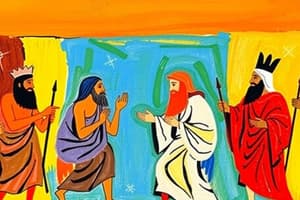Podcast
Questions and Answers
How did the Jewish people maintain their cohesion as a group despite being scattered throughout the world?
How did the Jewish people maintain their cohesion as a group despite being scattered throughout the world?
- They maintained a strong military presence in various regions.
- They actively sought converts and integrated into different cultures.
- They relied heavily on their shared rituals, sacred texts, and intermarriage. (correct)
- They established a centralized government to oversee their communities.
What was the impact of political and military developments on the Jewish people?
What was the impact of political and military developments on the Jewish people?
- The Hebrew people were able to expand their territory and influence across the Mediterranean.
- The Hebrew people unified under a single empire and prospered.
- The Hebrew people were forced to migrate and establish their own independent nation.
- The Hebrew people faced exile and scattering across different regions, leading to the diaspora. (correct)
What aspect of the Hebrew beliefs does the passage from Psalms convey?
What aspect of the Hebrew beliefs does the passage from Psalms convey?
- The importance of conquering surrounding kingdoms.
- The belief that good deeds are rewarded by God with material blessings and happiness. (correct)
- The value of wealth and material possessions as a sign of God's favor.
- The power of prayers and sacrifices to influence God's will.
What does the passage from Psalms suggest about the Hebrew belief in God?
What does the passage from Psalms suggest about the Hebrew belief in God?
What is the estimated Jewish population today?
What is the estimated Jewish population today?
According to the provided text, what characterized the Hebrew religion?
According to the provided text, what characterized the Hebrew religion?
The rise of written traditions in the first millennium BCE led to the creation of the Torah. What is the Torah?
The rise of written traditions in the first millennium BCE led to the creation of the Torah. What is the Torah?
How did the Hebrews, a relatively small group, spread their ideas over a large geographic region?
How did the Hebrews, a relatively small group, spread their ideas over a large geographic region?
What event is depicted in the fresco from the Dura-Europas synagogue?
What event is depicted in the fresco from the Dura-Europas synagogue?
How did the term "Old Testament" come to be associated with the Hebrew Bible?
How did the term "Old Testament" come to be associated with the Hebrew Bible?
What evidence is primarily used to understand the early history of the Hebrews?
What evidence is primarily used to understand the early history of the Hebrews?
The text mentions that the Hebrews were politically unimportant compared to empires like the Egyptians and Babylonians. What does this suggest about their initial influence?
The text mentions that the Hebrews were politically unimportant compared to empires like the Egyptians and Babylonians. What does this suggest about their initial influence?
From the text, what can we infer about the relationship between the Hebrew Bible and the writings of the Christians?
From the text, what can we infer about the relationship between the Hebrew Bible and the writings of the Christians?
What was the most important factor in determining the religious practices of ancient Jews?
What was the most important factor in determining the religious practices of ancient Jews?
How did the transition from nomadic pastoralism to settled agriculture impact the Hebrews?
How did the transition from nomadic pastoralism to settled agriculture impact the Hebrews?
What was the central function of the Temple of Jerusalem?
What was the central function of the Temple of Jerusalem?
Which of the following was NOT a direct consequence of the Hebrew's transition to settled agriculture in Canaan?
Which of the following was NOT a direct consequence of the Hebrew's transition to settled agriculture in Canaan?
What was the significance of the Ten Commandments for the Hebrews?
What was the significance of the Ten Commandments for the Hebrews?
What role did prophets like Jeremiah, Ezekiel, and Isaiah play in ancient Hebrew society?
What role did prophets like Jeremiah, Ezekiel, and Isaiah play in ancient Hebrew society?
Why were sons considered particularly important within Jewish families?
Why were sons considered particularly important within Jewish families?
What historical pattern did the Hebrews follow when they adopted the agricultural practices of the Canaanites?
What historical pattern did the Hebrews follow when they adopted the agricultural practices of the Canaanites?
Which of the following best describes the relationship between the Hebrews and the Philistines during the biblical period?
Which of the following best describes the relationship between the Hebrews and the Philistines during the biblical period?
How did the concept of the Covenant impact the Hebrews?
How did the concept of the Covenant impact the Hebrews?
How did the development of urban life change the economic activities of the Hebrews?
How did the development of urban life change the economic activities of the Hebrews?
Why did the Hebrews face spiritual challenges once they settled in Canaan?
Why did the Hebrews face spiritual challenges once they settled in Canaan?
What was a significant difference between the Hebrews and other ancient societies?
What was a significant difference between the Hebrews and other ancient societies?
What was the significance of King David's capturing Jerusalem?
What was the significance of King David's capturing Jerusalem?
How did the construction of the Temple of Jerusalem contribute to the development of the Hebrew kingdom?
How did the construction of the Temple of Jerusalem contribute to the development of the Hebrew kingdom?
What does the text suggest about the importance of family relationships in Jewish society?
What does the text suggest about the importance of family relationships in Jewish society?
Which of the following was a primary reason for the break-up of Solomon's kingdom after his death?
Which of the following was a primary reason for the break-up of Solomon's kingdom after his death?
Flashcards
Monotheism
Monotheism
The worship of one supreme god.
Torah
Torah
These books contain the traditional laws, history, and ethics of the Hebrew people, forming the core of Judaism.
Hebrew Bible
Hebrew Bible
The Hebrew Bible comprises the Torah plus additional writings like prophecies and hymns.
Kingdom of Judah
Kingdom of Judah
Signup and view all the flashcards
Diaspora
Diaspora
Signup and view all the flashcards
YHWH
YHWH
Signup and view all the flashcards
Canaan
Canaan
Signup and view all the flashcards
Dura-Europas Synagogue Fresco
Dura-Europas Synagogue Fresco
Signup and view all the flashcards
Book of Psalms
Book of Psalms
Signup and view all the flashcards
Divine Punishment
Divine Punishment
Signup and view all the flashcards
Divine Mercy
Divine Mercy
Signup and view all the flashcards
Peace be upon Israel
Peace be upon Israel
Signup and view all the flashcards
Covenant
Covenant
Signup and view all the flashcards
Abraham
Abraham
Signup and view all the flashcards
Moses
Moses
Signup and view all the flashcards
Ten Commandments
Ten Commandments
Signup and view all the flashcards
Prophets
Prophets
Signup and view all the flashcards
Hebrew Law
Hebrew Law
Signup and view all the flashcards
Jewish Rituals
Jewish Rituals
Signup and view all the flashcards
Shift from Nomadic to Settled Life
Shift from Nomadic to Settled Life
Signup and view all the flashcards
Urbanization
Urbanization
Signup and view all the flashcards
Importance of Family
Importance of Family
Signup and view all the flashcards
Rise of Jewish Kings
Rise of Jewish Kings
Signup and view all the flashcards
Jerusalem
Jerusalem
Signup and view all the flashcards
Temple of Jerusalem
Temple of Jerusalem
Signup and view all the flashcards
Division of the Kingdom
Division of the Kingdom
Signup and view all the flashcards
Study Notes
Origins of Judaism
- Judaism, a monotheistic faith, originated among the Hebrew people in the first millennium BCE.
- Recorded traditions, initially oral, were written down during this period.
- Hebrews established small kingdoms in Canaan, a region between the Mediterranean and Jordan River, but were politically insignificant compared to empires like Egypt and Babylon.
- Their religion centered on the worship of a single, all-powerful god, YHWH (Yahweh).
- The Torah, the first five books of the Hebrew Bible, compiled Hebrews' traditions, laws, history, and ethics.
- The Hebrew Bible expanded over time to include other works like advice, prayers, hymns, and prophecies.
Development of Jewish Religion
- The concept of a covenant, an agreement between God and humankind, is central to Judaism.
- This covenant was first established between God and Abraham, whose descendants were promised blessings if they followed God.
- God also made a covenant with Moses, who led the Hebrews out of Egyptian slavery.
- Prophets, like Abraham, Moses, Jeremiah, Ezekiel, and Isaiah, relayed messages from God to the Hebrews.
- The Ten Commandments outlined fundamental religious and ethical principles, forming a basis for Hebrew law.
- Rules regarding worship, ethics, food preparation, daily life, and rituals were part of this system.
Jewish Society and Family Life
- Hebrews initially were nomads, then settled in agriculture, forming tribes or families.
- Land use shifted from communal to private ownership.
- Urbanization led to specialized crafts and trade, often within families.
- Women played roles in agriculture and commerce, in accordance with societal norms.
- Marriage, family, and childbearing were sacred and important, with a preference for sons.
- Males led households and provided education.
Political History and Diaspora
- Hebrews faced conflicts and adapted to the cultures of their neighbors.
- The Philistines were a significant military threat.
- Saul established a monarchy over the Hebrew tribes, followed by David, who made Jerusalem the center.
- Solomon's building program included the Temple of Jerusalem.
- The kingdom of Israel divided into Israel and Judah.
- Conquest by neighboring kingdoms led to periods of exile and diaspora, spreading Jews across the Mediterranean and beyond.
- Judaism spread geographically, but remained a minority population.
Key Principles
- God is understood as both punishing and forgiving.
- Following God's commandments leads to blessings, happiness, and prosperity.
- The family and community are significant to Jewish life.
- The Bible's Psalms depict God as loving and protective.
Jewish Population
- Today the total world jewish population is estimated at about 15 million.
Studying That Suits You
Use AI to generate personalized quizzes and flashcards to suit your learning preferences.




